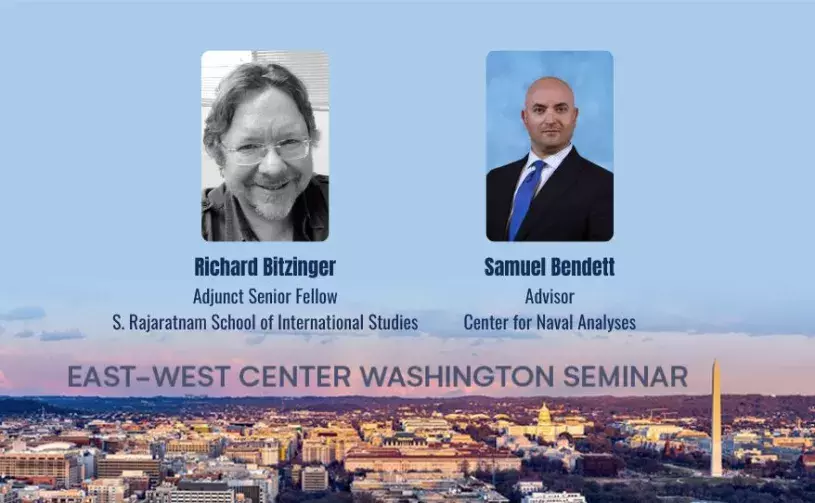Error message

OFFICE/DEPARTMENT
The East-West Center in Washington invites you to an
Indo-Pacific Foreign Policy and Defense Series Seminar:
The Fourth Industrial Revolution and Military–Civil Fusion
A Conversation With:
Richard Bitzinger
Adjunct Senior Fellow
S. Rajaratnam School of International Studies
Samuel Bendett
Advisor
Center for Naval Analyses
Dr. Satu Limaye (Moderator)
Vice President, East-West Center &
Director, Research Program and East-West Center in Washington
Advanced commercial technologies offer new opportunities for defense applications that could greatly affect military power. This is particularly important when it comes to technologies found in the emerging “fourth industrial revolution,” such as artificial intelligence, autonomous systems, “big data,” and quantum computing. Militaries and governments around the world are increasingly focused on how to leverage such technologies for military advantage. This process of exploiting civilian-based advanced technologies is often referred to as “military–civil fusion” (MCF). This book addresses MCF both as a concept and also how four different countries – the United States, China, India, and Israel – are attempting to use MCF to support military-technological innovation.

Richard A. Bitzinger is an Adjunct Senior Fellow with the Military Transformations Program at the S. Rajaratnam School of International Studies (RSIS), where his work has focused on security and defense issues relating to the Asia-Pacific region, including military modernization and force transformation, regional defense industries and local armaments production, and weapons proliferation. He was a Senior Fellow at RSIS from 2006 to 2018, and he headed up the Military Transformations Program from 2012 to 2018. He has written several books, monographs, and book chapters, and his articles have appeared in such journals as International Security, Orbis, China Quarterly, and Survival. He is the author of Arming Asia: Technonationalism and Its Impact on Local Defense Industries (2017), and the editor of Defense Industries in the 21st Century: A Comparative Analysis (2020) and Reshaping the Chinese Military: The PLA’s Roles and Missions in the Xi Jinping Era (2019). His other publications include “Come the Revolution: Transforming the Asia- Pacific’s Militaries” (Naval War College Review, 2005) and “Military-Technological Innovation in Small States: The Cases of Israel and Singapore” (Journal of Strategic Studies, 2021). He has previously worked at the RAND Corporation, the Center for Strategic and Budgetary Affairs, the Asia-Pacific Center for Security Studies, and the US Central Intelligence Agency.

Samuel Bendett’s research focuses on Russian defense and technology developments; uncrewed, robotic and autonomous military systems; artificial intelligence; and Russian military capabilities. Bendett’s analyses, views and commentary on Russia’s military robotics, autonomous systems and artificial intelligence capabilities have appeared in numerous global publications and news outlets.
Prior to joining CNA, Bendett worked at the National Defense University on emerging and disruptive technologies to aid the Department of Defense (DOD) in responding to domestic and international crisis situations. His previous experience includes working for the U.S. Congress, the private sector and nonprofit organizations on foreign policy, international conflict resolution, and defense and security issues.
Bendett is also an adjunct senior fellow at the Center for a New American Security, an honorary “mad scientist” with the Mad Scientist Initiative of the U.S. Army Training and Doctrine Command, and a Russian military autonomy and artificial intelligence subject matter expert for the DOD’s Defense Systems Information Analysis Center.

Dr. Satu P. Limaye is Vice President of the East-West Center and Director of Research, East-West Center in Washington, and interim director of the Professional Development Program. He created and directs the Asia Matters for America initiative and is the founding editor of the Asia Pacific Bulletin. He is also a Senior Advisor at CNA Corp (Center for Naval Analyses). He is a graduate of Georgetown University and received his doctorate from Oxford University (Magdalen College) where he was a George C. Marshall Scholar.
He publishes and speaks on Indo-Pacific regional issues and supports various US government, foundation, fellowship, and professional organizations. He recently served on the Center for New American Security (CNAS) Task Force on the US-Philippines Alliance, United States Institute of Peace (USIP) Senior Study Group on the North Pacific, Project 2049 Study Group on the US-Australia Alliance, and Global Taiwan Institute-Taiwan Asia Exchange Foundation project on Taiwan’s New Southbound Policy. He serves on the Korea Economic Institute (KEI) Advisory Council and editorial board of East Asian Policy and regional editor of Global Asia.
The East-West Center in Washington invites you to an
Indo-Pacific Foreign Policy and Defense Series Seminar:
The Fourth Industrial Revolution and Military–Civil Fusion
A Conversation With:
Richard Bitzinger
Adjunct Senior Fellow
S. Rajaratnam School of International Studies
Samuel Bendett
Advisor
Center for Naval Analyses
Dr. Satu Limaye (Moderator)
Vice President, East-West Center &
Director, Research Program and East-West Center in Washington
Advanced commercial technologies offer new opportunities for defense applications that could greatly affect military power. This is particularly important when it comes to technologies found in the emerging “fourth industrial revolution,” such as artificial intelligence, autonomous systems, “big data,” and quantum computing. Militaries and governments around the world are increasingly focused on how to leverage such technologies for military advantage. This process of exploiting civilian-based advanced technologies is often referred to as “military–civil fusion” (MCF). This book addresses MCF both as a concept and also how four different countries – the United States, China, India, and Israel – are attempting to use MCF to support military-technological innovation.

Richard A. Bitzinger is an Adjunct Senior Fellow with the Military Transformations Program at the S. Rajaratnam School of International Studies (RSIS), where his work has focused on security and defense issues relating to the Asia-Pacific region, including military modernization and force transformation, regional defense industries and local armaments production, and weapons proliferation. He was a Senior Fellow at RSIS from 2006 to 2018, and he headed up the Military Transformations Program from 2012 to 2018. He has written several books, monographs, and book chapters, and his articles have appeared in such journals as International Security, Orbis, China Quarterly, and Survival. He is the author of Arming Asia: Technonationalism and Its Impact on Local Defense Industries (2017), and the editor of Defense Industries in the 21st Century: A Comparative Analysis (2020) and Reshaping the Chinese Military: The PLA’s Roles and Missions in the Xi Jinping Era (2019). His other publications include “Come the Revolution: Transforming the Asia- Pacific’s Militaries” (Naval War College Review, 2005) and “Military-Technological Innovation in Small States: The Cases of Israel and Singapore” (Journal of Strategic Studies, 2021). He has previously worked at the RAND Corporation, the Center for Strategic and Budgetary Affairs, the Asia-Pacific Center for Security Studies, and the US Central Intelligence Agency.

Samuel Bendett’s research focuses on Russian defense and technology developments; uncrewed, robotic and autonomous military systems; artificial intelligence; and Russian military capabilities. Bendett’s analyses, views and commentary on Russia’s military robotics, autonomous systems and artificial intelligence capabilities have appeared in numerous global publications and news outlets.
Prior to joining CNA, Bendett worked at the National Defense University on emerging and disruptive technologies to aid the Department of Defense (DOD) in responding to domestic and international crisis situations. His previous experience includes working for the U.S. Congress, the private sector and nonprofit organizations on foreign policy, international conflict resolution, and defense and security issues.
Bendett is also an adjunct senior fellow at the Center for a New American Security, an honorary “mad scientist” with the Mad Scientist Initiative of the U.S. Army Training and Doctrine Command, and a Russian military autonomy and artificial intelligence subject matter expert for the DOD’s Defense Systems Information Analysis Center.

Dr. Satu P. Limaye is Vice President of the East-West Center and Director of Research, East-West Center in Washington, and interim director of the Professional Development Program. He created and directs the Asia Matters for America initiative and is the founding editor of the Asia Pacific Bulletin. He is also a Senior Advisor at CNA Corp (Center for Naval Analyses). He is a graduate of Georgetown University and received his doctorate from Oxford University (Magdalen College) where he was a George C. Marshall Scholar.
He publishes and speaks on Indo-Pacific regional issues and supports various US government, foundation, fellowship, and professional organizations. He recently served on the Center for New American Security (CNAS) Task Force on the US-Philippines Alliance, United States Institute of Peace (USIP) Senior Study Group on the North Pacific, Project 2049 Study Group on the US-Australia Alliance, and Global Taiwan Institute-Taiwan Asia Exchange Foundation project on Taiwan’s New Southbound Policy. He serves on the Korea Economic Institute (KEI) Advisory Council and editorial board of East Asian Policy and regional editor of Global Asia.













